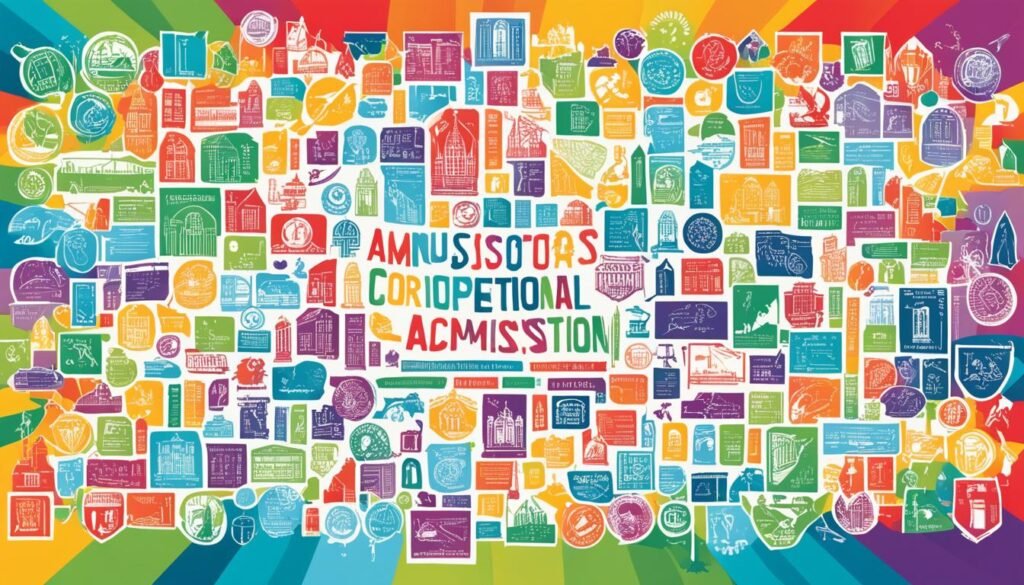When you decide to study in the United States, you are making an incredible decision for your future and will be joining more than one million international students in the USA. As an international student, your journey to the US will begin with selecting the university where you want to study and the academic program you want to pursue. The application process for international students is different from U.S. resident students, and it is important to review all the requirements for applying as an international student.
Key Takeaways
- Understand the unique application requirements for international students studying in the USA
- Learn about the necessary documentation, including transcripts, test scores, and financial certification
- Explore visa and immigration procedures for international students
- Discover resources and support services available to help international students succeed
- Familiarize yourself with English proficiency and health evaluation requirements
Why Study in the USA?
The United States is a premier destination for international students seeking a world-class education. With its renowned academic institutions, diverse cultural landscape, and abundant career support, the USA offers a truly transformative experience for those seeking to further their studies abroad. From the benefits of studying in the USA to the international student experience, there are countless reasons why the US should be at the top of every global learner’s list.
Career Support and Cultural Diversity
American universities are renowned for their exceptional career services, providing international students with the tools and resources to achieve their professional goals. Through extensive networking opportunities, internship programs, and personalized career counseling, these institutions empower students to explore a wide range of career paths and make valuable industry connections. Additionally, the cultural diversity found on US campuses allows students to immerse themselves in a truly global community, fostering an enriching and transformative experience.
Renowned Academic Programs
The United States is home to some of the world’s most prestigious universities, offering top-tier academic programs across a variety of disciplines. From STEM fields to the humanities, international students can access cutting-edge research, innovative curricula, and world-class faculty at the country’s leading institutions. This unparalleled educational experience equips students with the knowledge and skills necessary to thrive in their chosen careers and make a lasting impact on a global scale.
Choosing a University Program
When selecting a university program in the USA, international students should carefully consider various factors. The size of the university, whether it’s a public or private college, the campus location, available academic programs, extracurricular activities, and student support services are all important elements to evaluate.
Many students in the United States change their intended major during their college experience, so it’s crucial for international applicants to keep an open mind and explore different academic interests. The academic program options for international students can vary greatly, from traditional liberal arts to specialized fields like engineering, business, or technology.
The factors to consider when choosing a university in the USA include the institution’s reputation, rankings, and the specific program that aligns with the student’s goals. Additionally, the cost of tuition, living expenses, and availability of scholarships or financial aid should be carefully evaluated when selecting a university program in the USA.

By thoroughly researching and evaluating these key factors, international students can make an informed decision and find the best-fit university program to support their academic and personal growth during their time in the United States.
Undergraduate Student Applications
Applying to US universities as an international undergraduate student can be a comprehensive process. The key requirements typically include submitting personal information, academic transcripts, standardized test scores, an application essay, letters of recommendation, and a copy of a valid passport. Some colleges may also request a resume or proof of financial resources to cover the cost of education.
One crucial aspect to consider is the application timeline. Many selective universities have early action or early decision deadlines in November or December, so it’s important to be aware of these timelines when planning your international undergraduate application requirements. Staying organized and submitting all necessary documents by the designated deadlines is crucial for a successful application.

Overall, the international undergraduate application process can be detailed, but by understanding the necessary documents and adhering to the timeline, international students can navigate the requirements effectively and increase their chances of admission to their desired US university program.
Graduate Student Applications
Applying to graduate programs in the United States as an international student requires a comprehensive set of documents. Along with the application form, aspiring graduate students must submit their academic transcripts and standardized test scores, such as the GRE or GMAT, to demonstrate their academic qualifications. These tests are widely used in US graduate programs to assess an applicant’s readiness for rigorous graduate-level studies.
Academic Transcripts and Test Scores
Academic transcripts from the applicant’s undergraduate degree program are a crucial component of the graduate school application. These transcripts provide a detailed record of the courses taken, grades earned, and the overall academic performance of the student. In addition, most US graduate programs require international applicants to submit standardized test scores, typically the GRE or GMAT, to showcase their analytical, verbal, and quantitative skills.
Statement of Purpose and Recommendations
Alongside the academic credentials, graduate applicants must also submit a statement of purpose, which is a personal essay outlining their academic and professional goals, research interests, and how the chosen graduate program aligns with their aspirations. Furthermore, letters of recommendation from academic or professional references can provide valuable insights into the applicant’s strengths, skills, and potential for success in graduate-level studies.
The comprehensive application process for international graduate students in the United States ensures that admissions committees have a well-rounded understanding of each applicant’s qualifications, motivations, and suitability for the program. By meeting these international graduate student application requirements, including submitting GRE/GMAT for US graduate programs and the required documents needed for US graduate school application, international students can enhance their chances of securing a spot in their desired graduate program.

International student admission requirements
Aspiring international students hoping to study in the United States must fulfill a comprehensive set of admission requirements. These general requirements for international students to study in the USA typically include providing personal information, academic transcripts, standardized test scores, an essay or statement of purpose, letters of recommendation, a copy of a valid passport, and details about extracurricular activities.
The common application criteria for international applicants often go beyond the basics. Some colleges may also request an interview or proof of financial resources to cover the cost of attendance. Demonstrating English proficiency through recognized tests like TOEFL or IELTS is usually a prerequisite as well.

By meeting these rigorous standards, international students can increase their chances of gaining acceptance into the renowned academic programs offered by universities across the United States. The application process allows institutions to assess an applicant’s academic qualifications, language skills, and overall fit for the institution’s educational environment.
English Proficiency Requirements
Prospective international students seeking admission to US universities must demonstrate their English language proficiency. This is a crucial requirement, as the majority of academic programs are conducted in English. The most common ways to satisfy this need are by submitting minimum scores on standardized tests like the TOEFL, IELTS, or Duolingo English Test.
The TOEFL (Test of English as a Foreign Language) and IELTS (International English Language Testing System) are widely recognized English proficiency exams accepted by universities across the United States. They assess an applicant’s abilities in reading, writing, listening, and speaking. Minimum TOEFL and IELTS scores vary by institution, but generally range from 61 to 100 for the TOEFL and 6.0 to 7.5 for the IELTS.
Some universities may also accept SAT or ACT scores as proof of English language proficiency for international students, provided the applicant meets the required benchmarks. The Duolingo English Test, a newer online assessment, is gaining popularity as an alternative to traditional standardized tests for demonstrating English skills.
Ultimately, international applicants must research the specific English proficiency requirements for their desired US university programs, as the standards can vary. By meeting these criteria, they can enhance their chances of securing admission and ensuring a successful academic journey.
Financial Certification
To study in the United States as an international student, you must demonstrate that you have sufficient financial resources to cover the full cost of your education. This typically involves providing a certification from your financial institution, showcasing the required funds available for tuition, fees, living expenses, books, and health insurance. International students are not eligible for federal or state financial aid in the U.S., so they must rely on personal, family, or private scholarship funds to finance their studies.
Proving Financial Resources
The financial requirements for international students in the USA can vary depending on the university and program you choose. The average cost of studying in the US, including tuition and living expenses, can range from $20,000 to $50,000 or more per year. To demonstrate your ability to cover these costs, you may need to provide bank statements, investment records, or documentation of scholarships or sponsorships. Researching the specific financial requirements for your desired university and program is crucial to ensure you have the necessary sources of funding for your international studies.
Health Evaluations and Insurance
Joining an international student community in the United States often comes with specific health requirements. Universities across the country will typically require international students to complete a comprehensive health evaluation form, which may include providing an up-to-date immunization history. This step is crucial in ensuring the well-being of the entire student body and campus community.
Alongside the health evaluation, international students must also obtain medical insurance coverage before they can officially enroll and register for classes. Many universities offer or even mandate the purchase of a campus-based health insurance plan, designed to cater to the unique needs of international students. These plans often provide comprehensive coverage, including access to on-campus health services and emergency care, ensuring international students can focus on their studies without worrying about unexpected medical expenses.
By fulfilling these health and insurance requirements, international students can seamlessly integrate into their new academic environment, safe in the knowledge that their medical needs are addressed. This proactive approach not only benefits the individual student but also contributes to the overall health and safety of the entire campus community.
Student Visas and Immigration
For international students who have been accepted to a university in the United States, the next step is to obtain an F-1 student visa. This process begins with the university issuing an I-20 form, which verifies the student’s eligibility for the F-1 visa. To apply for the visa, the student must take the I-20 to a U.S. embassy or consulate in their home country and go through an interview process.
Before the visa interview, the student must pay a SEVIS fee, which is a mandatory fee for international students studying in the U.S. This fee helps fund the Student and Exchange Visitor Information System (SEVIS), a program that tracks and monitors F-1 and M-1 students during their time in the country.
Once the F-1 visa is issued, the international student can travel to the United States and must register at the school listed on their I-20 form. Maintaining valid F-1 status is crucial, as it allows the student to remain in the country and continue their studies. By understanding the F-1 student visa requirements, SEVIS and I-20 processes, and the overall procedure for obtaining a U.S. student visa, international students can ensure a smooth transition to their academic journey in the United States.
Conclusion
Studying in the United States as an international student involves navigating a comprehensive application process. From selecting the right university program to securing the necessary student visa, each step requires careful planning and preparation. By understanding the key admission criteria, including academic qualifications, language proficiency, and financial requirements, international applicants can position themselves for success.
The path to studying in the USA encompasses several critical milestones, such as submitting undergraduate or graduate applications, providing academic transcripts and test scores, and demonstrating sufficient financial resources. Additionally, international students must meet English language standards and complete health evaluations and insurance requirements.
With the appropriate knowledge and resources, international students can seamlessly manage the admission process and embark on their academic journey in the United States. Leveraging the expertise of university admissions offices and immigration experts can help simplify the steps and ensure a smooth transition. By staying informed and proactive, aspiring international students can realize their dreams of studying in America.
Source Links
- Studying in America at USA Universities: A Guide for International Students – https://shorelight.com/student-stories/how-to-study-in-the-us-a-guide-for-international-students/
- Requirements for International Students | Undergraduate Admissions – https://www.psu.edu/resources/international-students/admission-requirements
- International Student: Admission Requirements | CSU – https://www.calstate.edu/apply/international/getting-into-the-csu/
Related Articles
- The Continents States University Becomes a Candidate for IACBE Accreditation - What It Means for Our Students
- Pursuing Academic Excellence - The Continents States University’s Journey as an IACBE Candidate
- How IACBE Accreditation Candidacy Enhances Educational Opportunities for Students at The Continents States University
- The Continents States University Students Set to Gain from IACBE Accreditation - Here’s How
- Empowering Futures - The Benefits of IACBE Candidacy for The Continents States University Students


